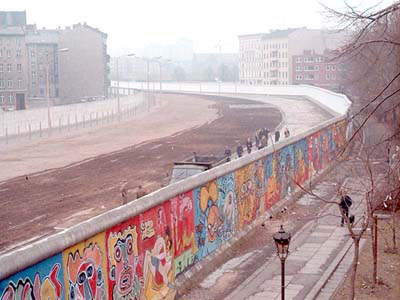The Berlin Wall : ambivalence and re-evalutation

Today marks the 18th anniversary of the fall of the Berlin Wall and the Guardian reports via Der Spiegel that more than 1 in 5 Germans would welcome its reinstatement. 90% of Germans from the old GDR believe that the East German state afforded greater social protection than the current unified German state.
This ambivalence to the Wall’s demise may seem bemusing and even shocking to those of us who remember its destruction as an epoch defining event. Its fall seemed to symbolise more than any other single event, the failure of the communist system, the demise of the Soviet Empire and the triumph of western values of freedom and democracy.
The survey’s findings seem more shocking still because they pertain to Germany; a state which to external observers has recovered from the legacy of two world wars and 40 years of division, to take its place as a modern industrial powerhouse at the heart of the European project. How can modern Germans look back with nostalgia at a Stalinist basket-case which had by its demise become bankrupt both in the literal economic sense and in the metaphorical moral sense?
Anyone who has travelled in the former Eastern Bloc and spoken to those who live there will be less surprised that East Germans in particular look back at their erstwhile state with mixed feelings. Throughout the old Soviet Empire, even the most liberal and Western orientated citizens of the new Europe have ambivalent feelings about the past. They will willingly acknowledge that increased freedoms have to be offset against turbulent social changes, poverty and the ravages of suddenly implemented free markets. Why should East Germans, experiencing high-unemployment and having suffered the destruction of their heavy industries and the dismantling of a cradle to grave welfare system, not share these anxieties?
Neither should it be surprising that people in the west are beginning to re-evaluate exactly what the fall of the Berlin Wall meant. Famously Fukuyama hailed the destruction of the Iron Curtain as “the end of history”. This was the moment when economic liberalism and democracy triumphed over its main ideological opponent. The result would be global stability, prosperity and freedom. There were no more wars left to be fought.
Of course this analysis now seems laughably naïve and naturally the event which was most neatly symbolic of this worldview has correspondingly acquired a taint of failed narrative. The fall of the wall and the break-up of the Soviet Empire was a harbinger, not of increased stability, but of the polar opposite.
Islamism was already a far more intractable opponent of western values than communism (after all a child of western discourse, of German discourse) could ever have been. Raeganite myopia failed to recognise this and the seeds of a flourishing and aggressive challenge to the west were ignored in unseemly haste to fell Gorbachev’s reforming regime.
West Germans were first to feel the effects of the huge movement of peoples which followed the demise of communism. Before the wall had fallen East German citizens were flooding west through newly opened borders in Czechoslovakia and Hungary. The transience of populations has become one the defining issues in Europe today. The days of the Berlin Wall can seem almost a paradigm of stability. Ethnic tensions and nationalism also flourished in the old Eastern Bloc, most demonstrably in a series of bloody Balkan wars.
Of course Der Spiegel’s poll also implies that 4 out of 5 Germans remain happy that the Wall came down and few people would wish to reinstate regimes in central or eastern Europe which were oppressive and anti-democratic. As those born as the Wall fell come of age though, this poll should give us pause for thought about western assumptions and cause us to question current narratives as we continue to reflect on those of the past.
Recommended reading: The Berlin Wall: 13 August 1961 - 9 November 1989 by Frederick Taylor
Comments